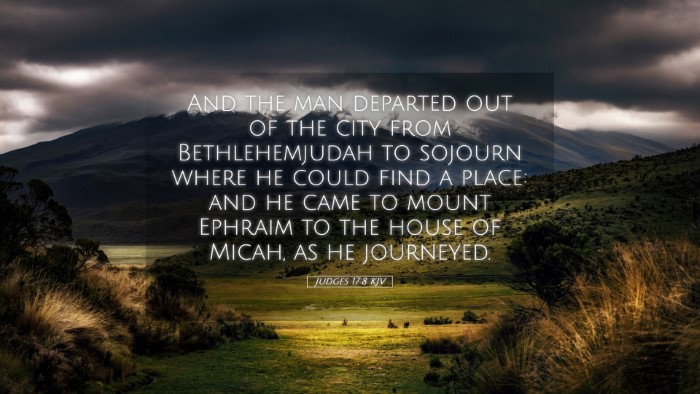Old Testament
Genesis Exodus Leviticus Numbers Deuteronomy Joshua Judges Ruth 1 Samuel 2 Samuel 1 Kings 2 Kings 1 Chronicles 2 Chronicles Ezra Nehemiah Esther Job Psalms Proverbs Ecclesiastes Song of Solomon Isaiah Jeremiah Lamentations Ezekiel Daniel Hosea Joel Amos Obadiah Jonah Micah Nahum Habakkuk Zephaniah Haggai Zechariah MalachiJudges 17:8
Judges 17:8 KJV
And the man departed out of the city from Bethlehemjudah to sojourn where he could find a place: and he came to mount Ephraim to the house of Micah, as he journeyed.
Judges 17:8 Bible Commentary
Bible Commentary on Judges 17:8
Judges 17:8: "And he went out of the city from Bethlehemjudah to sojourn where he could find a place: and he came to mount Ephraim to the house of Micah."
Introduction
This verse introduces the narrative of Micah and a wandering Levite, setting the stage for a complex interplay of religious practices and moral dilemmas within the context of Israel's history during the judges' period. The significance of this verse lies in its implications for understanding individual spiritual journeys, the breakdown of central worship, and the loose adherence to God's commandments.
Commentary Insights
Contextual Background
According to Matthew Henry, the Book of Judges outlines a period of moral and social decay among the Israelites. After settling in the Promised Land, they often strayed from God’s covenant. The mention of the Levite visiting Micah showcases the lack of centralized worship and reveals how personal choices affected corporate faith in Israel. It suggests that the Levite, acting on his own authority and without proper guidance, is emblematic of Israel's spiritual confusion.
The Journey of the Levite
Albert Barnes notes the Levite's decision to leave Bethlehem can signify a search for purpose and belonging amidst the spiritual chaos of the times. His movement from a recognized city of Israel to an obscure location among the mountains reflects the restless nature of his calling. The concept of 'sojourning' indicates that he was seeking something beyond his current situation; there’s a deeper longing for a place of identity and fulfillment in service to the Lord.
The Spiritual Repercussions
Adam Clarke provides an important insight into the implications of this journey for Israel's religious landscape. The Levite’s shift away from established worship points to the fragmentation of true worship. The Levite’s actions remind readers that individualism, divorced from godly community, can lead to personal and communal crisis. The fracturing of spiritual authority leads to chaos, as each person does what is right in their own eyes (Judges 21:25).
The House of Micah
This verse sets the stage for Micah's shrine, which represents a localized and illegitimate worship system. According to Henry, Micah's household exemplifies the spiritual errors of the day—a man creating his own forms of worship rather than adhering to the prescribed worship of Yahweh. The tension between personal devotion and authentic worship becomes a central theme in this narrative. The Levite is drawn to this house, and this choice is indicative of the compromises inherent in the religious practices of the time.
Theological Implications
This passage sheds light on several theological themes relevant to modern readers:
- The Pursuit of Authentic Worship: The Levite's quest for a place to serve God highlights the ongoing struggle for genuine worship.
- Community and Individualism: The verse illustrates the dangers that arise when individual spirituality overrides communal faith.
- The Nature of Divine Guidance: The Levite’s actions prompt reflection on the nature of divine calling and the importance of seeking God's will within the framework of community and tradition.
Lessons for Today
As modern readers, pastors, and theologians reflect on Judges 17:8, several lessons emerge:
- The Importance of Community: Just as the Levite's journey leads him to Micah rather than an established center of worship, Christians today must remember the role of community in fostering spiritual growth.
- Worship in Spirit and Truth: The Levite's experience serves as a cautionary tale about the importance of true worship as prescribed in Scripture rather than personal, self-styled religion.
- Seeking God’s Guidance: The Levite’s aimlessness urges us to seek divine direction and not rely solely on personal insight or desires.
Conclusion
Judges 17:8 exemplifies the complexities of faith during the time of the judges, embodying themes of spiritual confusion, the quest for identity, and the ramifications of an individualized approach to worship. The narrative invites believers to scrutinize their own practices and seek a holistic approach to worship that honors God's covenant, community, and truth.


